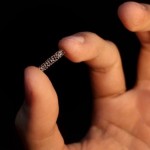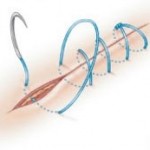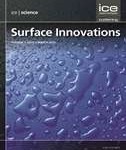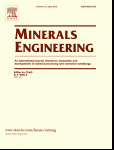Surface Innovations research team just got awarded with a two-year grant by the NIH – National Heart, Lung, and Blood Institute. We will study the biodegradable Zn-Mg alloys regarding their biocompatibility and biodegradation rate. The project is a collaborative effort between SURFI team and research teams led by Prof. Jeremy Goldman and Prof. Feng Zhao from Biomedical Engineering. we are happy receiving second funding from NIH this year.
Reproducibility of RHX dating
Graduate student Shan Zhao has published her first paper as the leading author. The paper is entitled “Reproducibility in Rehydroxylation of Ceramic Artifacts” and was accepted for publication by the Journal of American Ceramic Society. The paper is co-authored by Patrick Bowen, Prof. Jaroslaw Drelich, and Prof. Timothy Scarlett from the Department of Social Sciences.
Since its introduction in 2009, application of the rehydroxylation (RHX) technique for dating fired-clay ceramics has been controversial, with very few satisfactory dating results collected in the interim. The stability and efficiency of this technique has been called into question by several investigators in the last few years, who have struggled to reproduce and validate this new dating method. Based on our new mass gain measurements for ca. 2000-7000 years old ceramic artifacts, the reproducibility in the RHX process rate is analyzed and discussed. Timespan analysis was performed, and age uncertainty related to RHX dating technique was evaluated by considering the error propagation. The results show poor reproducibility of the RHX process in the samples of the same origins, which give new evidence for a revision of the RHX protocols.
Review on medical sutures
Dr. Jan-Marten Seitz, who left our research team a few months ago after spending one year postdoctoral fellowship program, has just published a review article entitled “Recent Advances in Biodegradable Metals for Medical Sutures: A Critical Review” in Advanced Healthcare Materials. In this review, biodegradable alloys made of Fe, Mg and Zn are critically evaluated as potential materials for the manufacturing of both soft and hard tissue sutures. In the case of soft tissue closing and stitching, these metals have to compete against currently available degradable polymers. In the case of hard tissue closing and stitching, biodegradable sternal wires could replace the permanent sutures made of stainless steel or titanium alloys. This review discusses the specific materials and degradation properties required by all suture materials and summarizes current suture testing protocols. It provides a well-grounded direction for the potential future use and continued development of biodegradable metals in post-surgical suturing and stitching of open wounds. The paper is co-authored by Dr. Martin Durisin from Hannover Medical School, Prof. Jeremy Goldman (Biomedical Engineering) and Prof. Jaroslaw Drelich from Michigan Tech.
Addition to SURFI Team
Surface Innovations team welcomes Ms. Avishan Arabshomali. Avishan has decided to join our research team for at least this summer, and likely will pursue her M.S. program in the area of bioabsorbable polymers. Avishan has earned her B.S. degree in polymer engineering at Islamic Azad University – Science and Research Branch – in Tehran, Iran. She will attempt to define her M.S. program topic this summer.
Advisory Committee Member
Prof. Drelich has been invited by the MLR Institute of Technology in Hyderabad (India) to serve as the Advisory Committee Member to the International Conference on Advancements in AeroMechanical Materials for Manufacturing that will take place in Hyderabad on June 26-28, 2016.
Symposium on Magnesium Implants
Patrick K. Bowen and Dr. Drelich are involved in organization of the symposium Magnesium-based Biodegradable Implants – to be part of the 2016 TMS Annual Meeting.
Magnesium-based Biodegradable Implants: One of the trends in biomedical implants is toward the use of degradable materials, challenging the paradigm that such devices should essentially remain neutral in the body. Magnesium is especially promising in this respect due to its biochemical as well as to its mechanical attributes. Hence the research and development of magnesium-based biodegradable implants has seen a strongly growing interest over recent years from the scientific and industrial communities. The symposium addresses this emerging multi-disciplinary field as a joint effort of the Biomaterials and Magnesium Committees. Following its initial edition in 2013, the symposium aims to give a topical update on the state of affairs. Papers will be presented on all aspects relating to magnesium-based implants including (cardio)-vascular, orthopedic and other applications. This covers alloy selection/development and processing (including associated coating and surface modification), in-vitro/in-vivo performance assessment and evaluation, as well as product design and certification.
Organizers include:
Martyn Alderman, Magnesium Elektron (Great Britain)
Patrick Bowen, Michigan Technological University (USA)
Jaroslaw Drelich, Michigan Technological University (USA)
Petra Maier, University of Applied Sciences Stralsund (Germany)
Wim Sillekens, European Space Agency (Netherlands)
Successful PhD research proposal
Please congratulate Shan Zhao for the successful defense of her Ph.D. research proposal this morning. Her Ph.D. research proposal is entitled Structural characteristics and corrosion behavior of biodegradable Zn-X alloys in stent application.
New contribution to SI
A new paper was published in the Surface Innovations journal by our team. The title of the paper is “Hydrophobic nano-asperities in control of energy barrier during particle-surface interactions” and is co-authored by J. Drelich and P.K. Bowen. The paper presents a theoretical analysis of colloidal interactions between rough spherical particles and flat surfaces and is based on extended – DLVO model adopted by the authors to such system geometry.
It is shown that hydrophobic asperities with the radius of only a few nanometers reduce the energy required for particle attachment to a hydrophobic surface by several times. The value of this energy barrier is reduced by as much as two orders of magnitude when the radius of nano-sized asperities increases to a few tens of nanometers. Theoretical analysis presented also reveals that surface coverage of microscopic particles by nano-sized asperities is not as important as the size of the asperities.
Paper on flotation of rough particles
Last year, Mr. Onur Guven, PhD candidate in the program of mineral processing engineering at the Istanbul Technical University in Turkey, working under a supervision of Prof. Mehmet S. Celik, spent a few months in our laboratories. He researched the effect of particle surface roughness on flotation separation of particles from electrolyte solutions. The results of his experimental work supported by theoretical analysis were recently summarized in a new article entitled “Flotation of methylated roughened glass particles and analysis of particle – bubble energy barrier” and published in the Minerals Engineering journal. In this publication, co-authored by Onur Guven, Mehmet Celik and Jarek Drelich, we claim, for the first time, that the size of nano-sized hydrophobic asperities distributed over spherical microscopic particles dictate the magnitude of the energetic barrier that particles need to overcome in order to attach to gas bubbles. This claim is strongly supported by theoretical modelling.
SI Volume 3 Issue 2
The 2nd issue of 2015 of the Surface Innovations journal is available. This is the themed issue on biofouling that was prepared by Dr. Chehimi and Dr. Carbonnier and contains 5 interesting papers.









